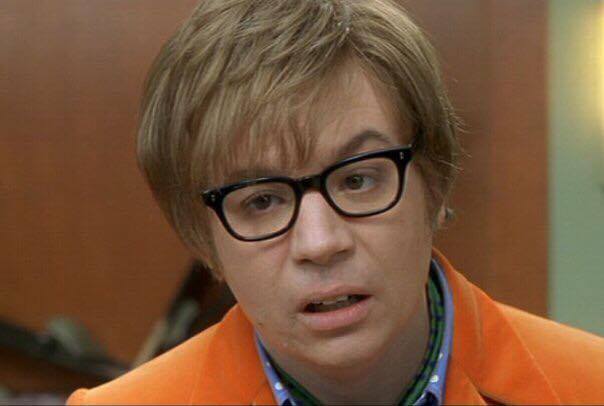This is fine.
🔥🙃🔥
I use this too much these days…
It’s been quite some time since I took stats, but wouldn’t six standard deviations put it in the true outlier category? If I’m even twenty percent correct in what I’m trying to communicate, that’s frightening.
Person who does lots of stats checking in. That’s a good question. We usually refer to Sigma (1-sigma, 2-sigma… 6-sigma) as the probability that an observation could occur by random chance.
The probability of 6-sigma occurring by random chance is about 1:1-billion.
So you’re definitely right to characterize it as an outlier. In terms of sea-ice this means that based on our observations of ice extent recorded going back to 1989 (based on the image) it is extremely unlikely we would expect to observe a sea ice extent so far below the norm suggesting something else (climate change) explains the deviation.
Been a while since I studied standard deviations but I remember 2 being already an outlier, 6 is a lot of deviation
I never took statistics, but 6 is at least triple the deviations of 2, and probably even more for math reasons I neither will nor can get into.
I did take statistics and forgot most of it, but I think I’m totally fine eating 2 hotdogs but the closer I get to 6 hotdogs, the increasingly more difficult it is.
Removed by mod
Correct, outlier until it’s repeated next year and the following. Then we can statistically say we’re fucked.
If that’s not a tipping point then I seriously have no idea what’s coming.
Just a friendly and terrifying reminder that it’s currently WINTER in the southern hemisphere.
Though I would like to see the data compared to other El Nino years.
The El nina years are in there (the blue lines) none of them look like this year at all.
That said, this chart is not the best for understanding the actual extent of the sea ice. It doesn’t show the amount of sea ice, it show how much there is relative to earlier years. The actual amount of sea ice is still growing at the moment, as one would expect in winter. Just not as much as earlier years.
I did look into other articles about the Antarctic ice since this graph was only about how different one bit is to the next, rather than any numbers for it to gain any substantial meaning. From the other article I read, we are losing 150 billion tons of ice per year since 2010… and a factor of 6 change over that is… terrifying.
What makes this worse is this is the deviation from the 1991-2020 mean, the hottest period of recording. If we compared with even 1981-2000, it would be even worse.
Action links:
- National Oceanic and Atmospheric Administration - link for volunteers to fight climate change
- Citizen’s Climate Lobby
- 8 Billion Trees
California specific, but it’s a cool program:
Side note: Repost from other spots on the Fediverse about this news - not karma whoring, just figure the best use of the sense of impending doom is to take action.
Well that’s the fucking worst graph I’ve ever seen.
Time to stock up the food hole.
deleted by creator
It’s going to be a mashup of 1984, waterworld, and Westworld, at this rate.
Plus MadMax
And idiocracy.
With a splash of Fantasia!
Waterworld 2084
My theory is we won’t care even when Louisiana and Florida get swallowed by the ocean but my god New York is fucked and that’s going to make money finally admit the problem.
Reminder to all, that I don’t care how many levees you build around the above mentioned areas you have lost. We can’t fight the ocean and we can’t fight nature.
We are going to learn far too late. I for one have my popcorn.
World is ded. Not big surprise.
Looks bad. I also suggest looking here for better context:
https://zacklabe.com/antarctic-sea-ice-extentconcentration/
(Zachary Labe is a climate scientist, Eliot Jacobson is a professor of mathematics)
My impression:
Ice extent is far below normal, 2023 is the worst year on recent record.
Ice volume has not responded dramatically yet (it has inertia) and there exists a year on recent record worse than 2023 - but it will respond soon enough.
Overall, I’m not sure if plotting a graph with standard deviations as the unit of measure is a good choice. It helps shake people up from sleep - yes. You typically look for standard deviations to determine if something is happening - and 6 deviations is considered solid proof. But to examine the quantity of ice, you measure square and cubic kilometers.
Ah yes, 1989. That’s when artic ice started, yep. Totally. I hear tell of the days of '88 when the lizard people in charge decided they needed a REALLY big freezer. Next year, boom. Artic ice.
I’m really, REALLY tired of all this climate alarmism that ignores thousands of millions of years of history that we could study. Instead, sensationalists want to be heard more than they actually want to say anything and hyperfocus on the right now this second. Do you know how uncommon it is for the average person to know that were still in an iceage, geologically speaking?
Yeah, why don’t people compare satellite pictures of sea ice now to the satellite pictures of sea ice from 10000 years ago? I’m sure they’re just trying to cover up secrets by not using that data.
They, much like you, are missing the point. We went from dinosaurs to cataclysmic post impact winter and life survived just fine. In fact, our species managed to evolve along the way, ice ages and super volcanoes be damned. Nothing humanity can do will “kill all life on the planet” or whatever other stupid shit they’re pedaling these days. We’re the hardest species to kill on this planet by FAR given any sort of prep time. Humanity will almost certainly survive whatever the climate can throw at us. And life in general survived everything short of another planet thrown at it so far. Things are just going to change. And life will adapt.
You are missing the point. You literally said “we’re the hardest species to kill on this planet by FAR given any sort of prep time”. Well, our prep time is running right now. We’ve theorized about this potential catastrophy for almost 2 centuries and have had pretty solid understanding of it happening for half a century. What have we done in that time? Jack shit. Considering we’re just wasting our prep time I certainly wouldn’t be as confident as you are about us surviving. And even if we do survive our lives will be worse off, all because some oil execs chose to run a disinformation campaign so their profits wouldn’t take a hit and people like you with their IDGAF attitude constantly derailing the issue.
We have a good thing here that we are certain to ruin because apparently we don’t need to make sure that good thing sticks around as just surviving is good enough, right?
I agree though it always annoys me when people claim we’ve done absolutely nothing - it’s an incredibly hard problem and people in and out of governments have been working on solutions and implementing them where possible. It takes time to develop workable technologies and to implement them efficiently but in a lot of places this is happening and we should highlight things that are working and showing promise so that good ideas spread, just saying ‘everything is bad and we’re going to die’ isn’t going to convince anyone to get on the right side of things but demonstrating we have lots of great ideas and emerging solutions which offer benefits even beyond climate protections just might.
Auke Hoekstra from the Eindhoven University of Technology in the Netherlands said: “Many young people are depressed because they feel climate change cannot be stopped. We want to offer them hope by showing that our world can get all its energy needs from renewables at a price below that of fossil fuels. When we first proposed this we were ridiculed, but this paper shows our ideas are now scientific mainstream.”.
from a study showing we can reach 100% renewable energy usable globally before 2050, and that’s just based on current rollout of existing technologies using existing methods and economies - automated construction tooling and fully-automated fabrication is going to greatly boost the rate at which adoption of new technologies can happen, and that’s without any black-swan developments which might come about especially through the use of AI r&d tools (such as those making huge leaps in chemistry and pharmacology currently) - though again as the study demonstrates we don’t even need these things to come about, and while our focus absolutely should be on protecting the ecology and climate of the planet we probably don’t even to have everyone onboard because transition to wind and solar is economically sensible too.
”Renewable energy technology is advancing rapidly, increasing the energy return on investment for renewable energy production; conversely, as fossil fuel reserves are depleted, they actually yield a decreasing return on investment as time goes by. Thus, if viewed in simple net energy terms, without even considering the climate change arguments for renewable energy, investing in renewable energy makes better physical and business sense than investing in fossil fuels.”
- Dr Marco Raugei Senior Research Fellow at Oxford Brookes University
Albania, Iceland, and Paraguay already obtain all their electricity from Renewable sources (hydro mostly), Sweden is getting close to 70% and very much on track to reach it’s target of 100% before it’s 2040 goal, Costa Rica is up at about 98% Renewables, Scotland ~97% with them on track to generate 50% of overall energy consumption (transport, heat, electrical) from renewables - big industrial countries are making huge progress too, Germany is now over 50% renewable and heavily ramping up the rate of adoption, on par with China who are also just over 50% and increasing rapidly (after heavy investment in technology and infrastructure to facilitate this change) - even the united states now has [slightly] more generation from renewables than coal AND more nuclear than coal -
Calling this ‘jack shit’ is absurd, and it’s only one strand of all the things people and governments have been working on, we’re working hard to understand the problem, monitor it, develop and implement solutions which allow us to try and keep things working for everyone and keep everyone alive. It’s not like we can just turn off oil or something, not only would millions die but it would undoubtedly start endless wars which would result in even more widespread chaos and climate destruction while ending all the positive steps people are working on. It’s an incredibly difficult challenge but we’re equipped to deal with it and if everyone that cares tries to pitch in a bit and work towards a better world then it’s absolutely possible - defeatism and doomerism isn’t going to get us anywhere.
The planet is going to change. No matter what we do to it, it will heal. Period. Without question. Humanity is so hyperfocused on controlling everything around us, we forget that we don’t matter nearly as much as we think we do. I dont think you comprehend the force the planet and all life on it withstood when the dinosaurs died out. Humanity ain’t shit compared to that. We are not the masters of the universe. We’re just another species on a single rock out of quadrillions. Check out what CO2 levels were 150million years ago and tell me that the earth will never recover from car emissions lmfao
Do you want to survive the next 50 years? Yes, the planet will be fine. Do you want some semblance of government that can manage day to day migration crises for want of food, lack of water, and oh yeah, continuous war over basic resources. But yes, the planet will be fine.
What about your children or if no child, your families descendants or any future human for that matter to enjoy what we’ve been spoiled with for our entire lives? And yes, I know… The planet WILL be fine. But we won’t be and a lot of other species will go well before us… Many have gone already.
This person is so enlightened that they probably don’t see the difference between stubbing one’s toe and global nuclear annihilation
Humanity will be fine. We’ve survived ice ages before, and I’m sure we’ll do so again. Suffering is a given. You are living in complete ignorance if you don’t believe there is suffering in your very own city right now this moment, no matter where you live in the world. Would there be more if governments collapsed and wars raged all over the world? Sure. But there is and will never be any period of “no suffering”. In fact, a massive population decline might very well lower the average suffering of the survivors for a while due to resource surplus. The point here is that humanity is not the end all be all of perspectives. Cataclysmic for us can be the dawn of a golden age for someone else. Give octopus or dolphins a shot.
So you’re frustrated by climate change alarmists because even if civilization collapses there will still likely be humans in a cave somewhere, and the octopus might have a shot at taking over the world?
Fortunately most people aren’t so horribly misanthropic; we actually care what happens to people.
pretending that scientists’ warnings and fears are exclusively about how climate change will ‘kill all life on the planet’ is entirely disingenuous
sure, there was still life after chicxulub. 75% of all species disappeared off the face of the earth, incomprehensible amounts of death and suffering, but there was still life
sure there will probably still be life, and humans, by the time this is done. the earth will be left unrecognisable, we will lose serious parts of global ecosystems, the number of animals going extinct will rise even more, diseases will thrive, food shortages will be everywhere, some cities will become uninhabitable, there will be ridiculous civil unrest, incomprehensible numbers will die
but yeah therell probably be humans left
there will be ridiculous civil unrest, incomprehensible numbers will die
If things get desperate enough direct conflict between nuclear powers of basic resources like food and water could be a thing as well. Sure, life will survive. Microbes for sure. Abyssal creatures probably won’t notice too much of a difference if they aren’t oxygen starved before then (not sure about how much of a risk that is)? Some species or plants and animals are hardy enough to survive and some will get lucky.
Exactly. The way we live now is unsustainable, but not for the planet. It’s unsustainable for us. When a global ecosystem collapses, a new one will grow in to fill the void. Life abhors a vacuum. Unfortunately for humanity, it also abhors hoarding. Our systems of hoarding will break down and the everyone has the big sad about it. Humanity has had every chance to worry about the bigger picture but has consistently chosen short term profit over longterm sustainability pretty much since we started writing shit down. I just wish we’d be more like the great central American cultures and accidentally leave behind a bunch of bitchin rainforest. Probably more like a bunch of mad max style endless badlands. Great for lizards, not so much the hairless water chimps.
Removed by mod
Regular people are not alarmed. They still buy fireworks, go on road trips, and consume like they’ve been taught their entire lives. The select few that ARE alarmed can’t do anything with a system built from the ground up to reward indifference to the environment. You need to worry about your fellow man a lot more than you need to worry about hunger or fire if you are privileged enough to even be a part of this conversation. And that’s the whole problem. Humanity, as a species, is violent, duplicitous, and primarily motivated by self enrichment. The best thing we as a species could do for the cosmos is build the machines that will keep us occupied here instead of strip mining the stars. We can’t be trusted with not destroying the universe to make the ultimate fidget spinner.
Removed by mod
Username checks out













